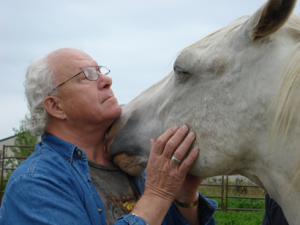
Several years ago I learned I have atrial fibrillation. I didn’t realize it’s a pretty common condition for people over 70.
As human beings, we are constantly learning. We seek out information on a given topic out of interest (how to play the guitar, or learn how to use my iPhone) or necessity (how to maintain a car). All learning has value, but I have found that it is particularly satisfying and valuable when interest and necessity intersect in the process. Learning how to grieve has been that type of learning experience for me. I learned out of necessity when my wife Shirley died of leukemia at 39 years of age and I became a widower with 4 children. My job with a company that I had been with for 18-1/2 years was eliminated. It was in the middle of a recession. I had no money, no job, no wife, unemployment was 10-12%. I was grieving and scared. During the journey of recovery the more I learned about grieving, the more I realized that I would benefit from this learning long-term. As we get older and experience more of life, we encounter even more losses. There are the usual forms of loss that might immediately come to mind such as:
- the loss of a loved one through death.
- the loss of a relationship thorough separation or divorce.
- the loss of a job, position or promotion.
But as we age we encounter another major loss. Our health.
Those of us who have been blessed with good physical health throughout much of our life must come to grips with the fact that we are not going to be physically perfect for the rest of our lives. We experience wakeup calls along the way, some big ones and some small ones. Perhaps you have experienced a heart attack, learned that you have diabetes or high blood pressure, or are struggling with high cholesterol. Perhaps you are diagnosed with cancer, are losing your eyesight through macular degeneration, or have noticed a hearing loss or a diminishing mental capacity. Maybe you are adjusting to a loss of mobility or physical dexterity. Several years ago I learned that I have atrial fibrillation, a common type of heart arrhythmia. While not a life-threatening condition if treated, it means medication for the rest of my life and the loss of the reassuring assumption that my heart is a flawless machine beating inside my chest. I felt devastated by this news, and soon after, I became angry about it. These feelings would have been bewildering to me had I not recognized them as signs of grieving. You see, losses of physical health such as this are often accompanied by the loss of our dreams, physical fitness, and energy. These losses are a reality of life as we age, but by educating ourselves on the process of grieving, we can effectively move past the loss and continue to live a good life on purpose. And that is just what I am working on right now regarding my new heart health reality. Grief: a primer. While its important to know that grieving takes time, its also important to know that generally it goes through phases:
- Disbelief
- Yearning
- Anger
- Depression
- Acceptance
Source: Journal of American Medical Association (JAMA) While it’s commonly believed that depression and sadness are the overriding emotions experienced by those in grief,  Holly Prigerson, PhD and her team of researchers at the Dana Farber Cancer Institute have found that Yearning is the predominant emotion. People grieving a loss yearn for things to return to what they once were. They yearn to go back to a time that once was and is now over. They yearn and pine for life to return to the way it used to be. While these 5 stages of grief are the most common, some suggest there are two more – guilt and bartering – that get added into the mix as we grieve. Why Should We Learn About Grief? Life is not a dress rehearsal. This is it. There are no do-overs. It is what it is. Life is short and in my view it’s simply not worthwhile to spend more time in grief than is necessary. There is no right or wrong way to grieve, nor is there a right or wrong length of time to spend in the process. I am not trying to diminish grief, but I do encourage people to learn about grief in order to move through as expeditiously as possible for them and their situation. There is a real sadness for me when I see people spending a lot of time in grief because they’ll miss out on celebrating and enjoying life in the present. Learning about grief has been very helpful for me, because it has armed me with the processes that I need to honor the loss I am experiencing and move through the grief onto a new beginning. Learning to live with loss requires you to:
Holly Prigerson, PhD and her team of researchers at the Dana Farber Cancer Institute have found that Yearning is the predominant emotion. People grieving a loss yearn for things to return to what they once were. They yearn to go back to a time that once was and is now over. They yearn and pine for life to return to the way it used to be. While these 5 stages of grief are the most common, some suggest there are two more – guilt and bartering – that get added into the mix as we grieve. Why Should We Learn About Grief? Life is not a dress rehearsal. This is it. There are no do-overs. It is what it is. Life is short and in my view it’s simply not worthwhile to spend more time in grief than is necessary. There is no right or wrong way to grieve, nor is there a right or wrong length of time to spend in the process. I am not trying to diminish grief, but I do encourage people to learn about grief in order to move through as expeditiously as possible for them and their situation. There is a real sadness for me when I see people spending a lot of time in grief because they’ll miss out on celebrating and enjoying life in the present. Learning about grief has been very helpful for me, because it has armed me with the processes that I need to honor the loss I am experiencing and move through the grief onto a new beginning. Learning to live with loss requires you to:
- Accept and adapt: recognize that the loss is permanent and adapt to the new reality.
- Release and let go: recognize when you are yearning and instead choose to let go of the old dream and design something new.
- Transition: recognize the resistance to letting go; realize that in order to move on one must be like a trapeze artist…you must let go of one trapeze to swing onto the next one.
- Move on: focus on your new beginning.
Let it go. Grieving is not a straight, linear process. As you move through the stages, you may go back and forth a bit. But the key to moving through grief as quickly as possible is “letting go”. Accept that you are going to be moving though a lot of emotions. Your goal is to accept that what you loved is lost and let go of expectations of what it should have been. It wouldn’t have done me a lot of good to stay stuck yearning for a heart that doesn’t have atrial fibrillation. I recognized that I must let go of the dream that I have a perfect heart and instead accept the situation. I reminded myself that grieving is a feeling that I can let go of and decide on a new beginning. When I look at how much time I have left on Earth, I realize I don’t have a lot of time to spend in mourning. Always look for the new beginning. Creating something new can be challenging, but it can also be very exciting. If you can get into the exciting part, you are off and running again.
Recommended Resource The following book on grieving has been really been impactful for me: The Way of Transition: Embracing Life’s Most Difficult Moments by William Bridges. Now it’s your turn. What losses are you dealing with in your life right now? Are you actively working on letting go, or are you stuck on yearning? Or anger? Do you have a desire to move through your grief more quickly so you can focus on a new, fulfilling dream for yourself?
Larry Freeborg
Larry Freeborg is a life transition coach focused on working with people in the “Bonus & Gifted Years” of their lives. His unique experiences working with businesses in strategic planning, business development (marketing & sales), leadership and personal development blended with his personal experiences with loss, training in life coaching, and equine guided coaching, form the foundation of his coaching practice.
Larry is available for speaking engagements with his popular “Refire, Don’t Retire!” and “Life Purpose Primer” presentations.



